Talcott Parsons: Social system
Relevance: Sociology: Paper I: Sociological Thinkers: Talcott parson: Social System
INTRODUCTION
The term ‘system’ implies an orderly arrangement, an interrelationship of parts. In the arrangement, every part has a fixed place and definite role to play. The parts are bound by interaction. To understand the functioning of a system, for example the human body, one has to analyse and identify the sub-systems (e.g. circulatory, nervous, digestive, excretionary systems etc.) and understand how these various subsystems enter into specific relations in the fulfillment of the organic function of the body.
Likewise, society may be viewed as a system of interrelated mutually dependent parts which cooperate to preserve a recognisable whole and to satisfy some purposes or goal. Social system may be described as an arrangement of social interactions based on shared norms and values. Individuals constitute it and each has place and function to perform within it.
Meaning of Social System:
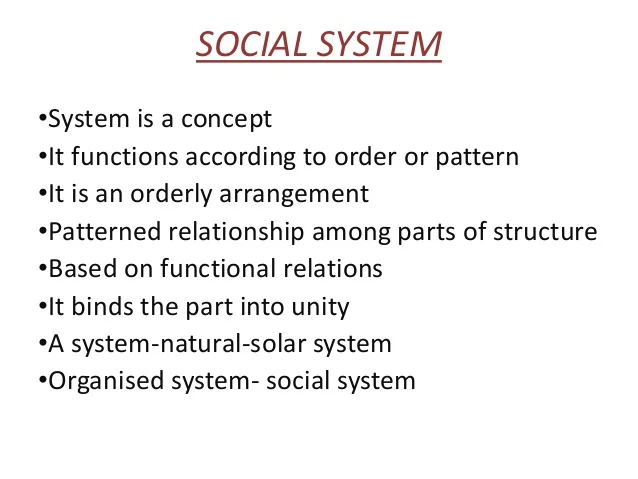
It is Talcott Parsons who has given the concept of ‘system’ current in modern sociology. Social system refers to’ an orderly arrangement, an inter relationships of parts. In the arrangement, every part has a fixed place and definite role to play. The parts are bound by interaction. System signifies, thus, patterned relationship among constituent parts of a structure which is based on functional relations and which makes these parts active and binds them into reality.
Society is a system of usages, authority and mutuality based on “We” felling and likeness. Differences within the society are not excluded. These are, however, subordinated to likeness. Inter-dependence and cooperation are its basis. It is bound by reciprocal awareness. It is essentially a pattern for imparting the social behaviour.
It consists in mutual inter action and interrelation of individuals and of the structure formed by their relations. It is not time bound. It is different from an aggregate of people and community. According to Lapiere, “The term society refers not to group of people, but to the complex pattern of the norms of inter action that arises among and between them.”
Applying these conclusions to society, social system may be described as an arrangement of social interactions based on shared norms and values. Individuals constitute it, and each has place and function to perform within it. In the process, one influences the other; groups are formed and they gain influence, numerous subgroup come into existence.
But all of these are coherent. They function as a whole. Neither individual, nor the group can function in isolation. They are bound in oneness, by norms and values, culture and shared behaviour. The pattern that thus comes into existence becomes the social system.
A social system may be defined, after Parsons, a plurality of social actors who are engaged in more or less stable interaction “according to shared cultural norms and meanings” Individuals constitute the basic interaction units. But the interacting units may be groups or organisation of individuals within the system.
The social system, according to Charles P. Loomis, is composed of the patterned interaction of visual actors whose’ relation to each other are mutually oriented through the definition of the mediation of pattern of structured and shared symbols and expectations.
All social organisations are, therefore, ‘social system’, since they consist of interacting individuals. In the social system each of the interacting individual has function or role to perform in terms of the status he occupies in the system. For example, in the family parents, sons and daughters are required to perform certain socially recognised functions or roles.
Similarly, social organisations function within the frame work of a normative pattern. Thus, a social system presupposes a social structure consisting of different parts which are interrelated in such a way as to perform its functions.
Social system is a comprehensive arrangement. It takes its orbit all the diverse subsystems such as the economic, political, religious and others and their interrelation too. Social systems are bound by environment such as geography. And this differentiates one system from another.
Elements of Social System:
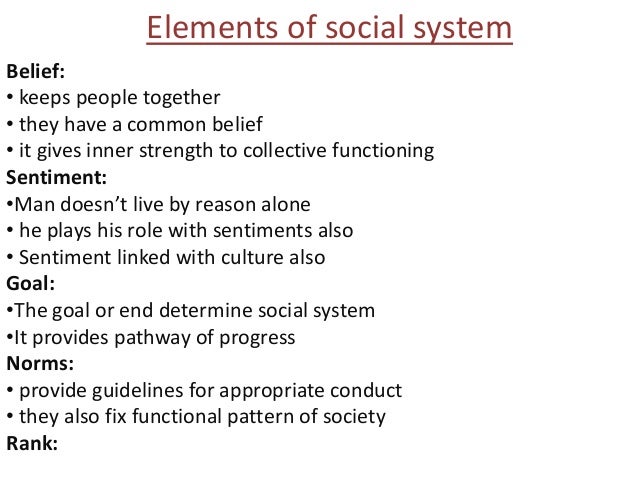
The elements of social system are described as under:
- Faiths and Knowledge:
The faiths and knowledge brings about the uniformity in the behaviour. They act as controlling agency of different types of human societies. The faiths or the faith is the result of the prevalent customs and beliefs. They enjoy the force of the individual are guided towards a particular direction.
- Sentiment:
Man does not live by reason alone. Sentiments – filial, social, notional etc. have played immense role in investing society with continuity. It is directly linked with the culture of the people.
- End Goal or object:
Man is born social and dependent. He has to meet his requirements and fulfill his obligations. Man and society exist between needs and satisfactions, end and goal. These determine the nature of social system. They provided the pathway of progress, and the receding horizons.
- Ideals and Norms:
The society lays down certain norms and ideals for keeping the social system intact and for determining the various functions of different units. These norms prescribe the rules and regulations on the basis of which individuals or persons may acquire their cultural goals and aims.
In other words ideals and norms are responsible for an ideal structure or system of the society. Due to them the human behaviour does not become deviant and they act according to the norms of the society. This leads to organization and stability. These norms and ideals include folkways, customs, traditions, fashions, morality, religion, etc.
- Status-Role:
Every individual in society is functional. He goes by status-role relation. It may come to the individual by virtue of his birth, sex, caste, or age. One may achieve it on the basis of service rendered.
- Role:
Like the status, society has prescribed different roles to different individuals. Sometimes we find that there is a role attached to every status. Role is the external expression of the status. While discharging certain jobs or doing certain things, every individual keeps in his mind his status. This thing leads to social integration, organization and unity in the social system. In fact statuses and roles go together. It is not possible to separate them completely from one another.
- Power:
Conflict is a part of social system, and order is its aim. It is implicit, therefore, that some should be invested with the power to punish the guilty and reward those who set an example. The authority exercising power will differ from group to group; while the authority of father may be supreme in the family, in the state it is that of the ruler.
- Sanction:
It implies confirmation by the superior in authority, of the acts done be the subordinate or the imposition of penalty for the infringement of the command. The acts done or not done according to norms may bring reward and punishment.
Characteristics of Social System:

Social system has certain characteristics. These characteristics are as follows:
- System is connected with the plurality of Individual actors:
It means that a system or social system cannot be borne as a result of the activity of one individual. It is the result of the activities of various individuals. For system, or social system, interaction of several individuals has to be there.
- Aim and Object:
Human interactions or activities of the individual actors should not be aimless or without object. These activities have to be according to certain aims and objects. The expression of different social relations borne as a result of human interaction.
- Order and Pattern amongst various Constituent Units:
Mere coming together of various constituent units that from social system does not necessarily create a social system. It has to be according to a pattern, arrangement and order. The underlined unity amongst various constituent units brings about ‘social system’.
- Functional Relationship is the Basis of Unity:
We have already seen different constituent units have a unity in order to form a system. This unity is based on functional relations. As a result of functional relationships between different constituent units an integrated whole is created and this is known as social system.
- Physical or Environmental Aspect of Social System:
It means that every social system is connected with a definite geographical area or place, time, society etc. In other words it means that social system is not the same at different times, at different place and under different circumstances. This characteristic of the social system again point out towards its dynamic or changeable nature.
- Linked with Cultural System:
Social system is also linked with cultural system. It means that cultural system bring about unity amongst different members of the society on the basis of cultures, traditions, religions etc.
- Expressed and implied Aims and Objects:
Social system is also linked with expressed and implied aims. In other words, it means that social system is the coming together of different individual actors who are motivated by their aims and objectives and their needs.
- Characteristics of Adjustment:
Social system has the characteristic of adjustment. It is a dynamic phenomenon which is influenced by the changes caused in the social form. We have also seen that the social system is influenced by the aims, objects and the needs of the society. It means that the social system shall be relevant only if it changes itself according to the changed objects and needs. It has been seen that change takes place in the social system due to human needs, environment and historical conditions and phenomena.
- Order, Pattern and Balance:
Social system has the characteristics of pattern, order and balance. Social system is not an integrated whole but putting together of different units. This coming together does not take place in a random and haphazard manner. There is an order am’ balance.
It is so because different units of the society do not work as independent units but they do not exist in a vacuum but in a socio-cultural pattern. In the pattern different units have different functions and roles. It means that there is a pattern and order in the social system.
Types of Social System:
Parsons presents a classification of four major types in terms of pattern variable. These are as follows:
- The Particularistic Astrictive Type:
According to Parsons, this type of social system tends to be organized around kinship and sociality. The normative patterns of such a system are traditional and thoroughly dominated by the elements of ascription. This type of system is mostly represented by preliterate societies in which needs are limited to biological survival.
- The Particularistic Achievement Type:
There is a significant role of religious ideas as differentiating element in social life. When these religious ideas are rationally systematized that possibility of new religious concepts emerge. As a result of this nature of prophecy and secondly it may depend on non-empirical realm to which the porphyry is connected.
- The Universalistic Achievement Type:
When ethical prophecy and non-empirical conceptions are combined, a new set of ethical norms arise. It is because the traditional order is challenged by the ethical prophet in the name of supernatural. Such norms are derived from the existing relations of social member; therefore they are universalistic in nature. Besides, they are related with empirical or non-empirical goals, therefore they are achievement oriented.
- The Universalistic Ascription Type:
Under this social type, elements of value orientation are dominated by the elements of ascription. Therefore emphasis is placed on status of the actor, rather than his performance. In such a system, actor’s achievements are almost values to a collective goal. Therefore such a system becomes politicized and aggressive. An authoritarian State example of this types.
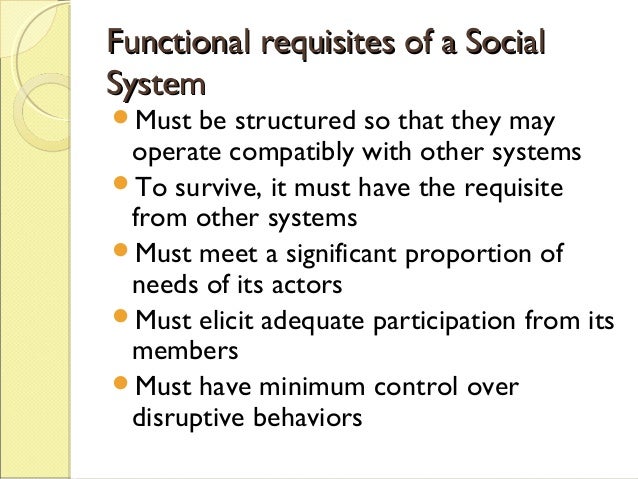
Maintenance of Social System:
A social system is maintained by the various mechanisms of social control. These mechanisms maintain the equilibrium between the various processes of social interaction.
In brief, these mechanisms may be classified in the following categories:
- Socialization.
- Social control.
(1) Socialization:
It is process by which an individual is adjusted with the conventional pattern of social behaviour. A child by birth is neither social nor unsocial. But the process of socialization develops him into a functioning member of society. He adjusts himself with the social situations conforming with social norms, values and standards.
(2) Social Control:
Like socialisation, social control is also a system of measures by which society moulds its members to conform with the approved pattern of social behaviour. According to Parsons, there are two types of elements which exist in every system. These are integrative and disintegrative and create obstacles in the advancement of integration.
Functions of Social System:
Social system is a functional arrangement. It would not exist if it were not so. Its functional character ensures social stability and continuity. The functional character of society, Parsons has discussed in depth. Other sociologists such as Robert F. Bales too have discussed it.
It is generally agreed that the social system has four primary functional problems to attend. These are:
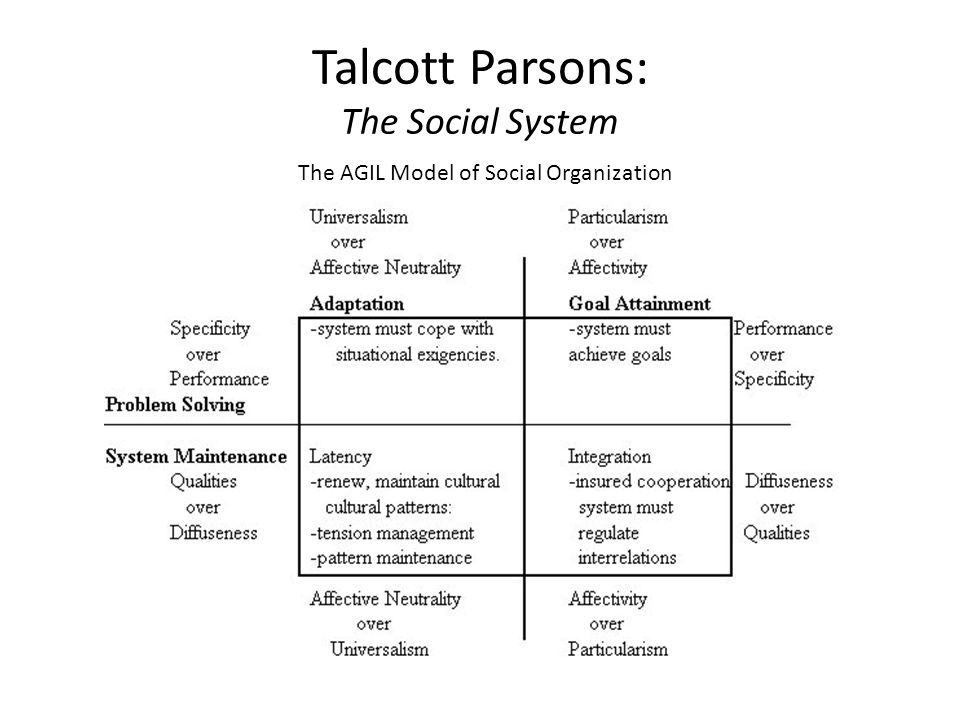
- Adaptation,
- Goal attainment,
- Integration,
- Latent Pattern-Maintenance.
- Adaptation:
1. Adaptability of social system to the changing environment is essential. No doubt, a social system is the result of geographical environment and a long drawn historical process which by necessity gives it permanence and rigidity. Yet, that should not make it wooden and inelastic. It need be a flexible and functional phenomenon.
Economy for its maintenance, division of labour for better production of goods and effective services, and role differentiation for job opportunity is essential. Durkheim in Division of Labour in society has given great attention to the role of division of labour and role differentiation as these make possible a higher average degree of skill than would otherwise be possible.
Lack of adaptability, very often has caused the social system to be challenged. It has caused revolution resulting in the overhauling of the system. The British system, in the nineteenth century, when the continent was in the inferno of revolution, showed remarkable adaptability. It responded well to the mounting demands of change. Over the time our system has demonstrated the excellent sense of adaptability.
- Goal Attainment:
Goal attainment and adaptability are deeply interconnected. Both contribute to the maintenance of social order.
Every social system has one or more goals to be attained through cooperative effort. Perhaps the best example of a societal goal is national security. Adaptation to the social and nonsocial environment is, of course, necessary if goals are to be attained. But in addition, human and nonhuman resources must be mobilised in some effective way, according to the specific nature of tasks.
For example, there must be a process of ensuring that enough persons, but not too many, occupy each of the roles at a particular time and a process for determining which persons will occupy which roles. These processes together solve the problem of allocation of members in the social system. We have already touched upon the “need” for property norms. The rules regulating inheritance e.g., primogeniture-in part solve this problem.
The allocation of members and the allocation of scarce valuable resources are important, of course, for both adaptation and goal attainment. The difference between adaptation and goal attainment is a relative one.
The economy of a society is that subsystem which produces goods and services for a wide variety of purposes; the “polity”, which includes above all the Government in complex societies, mobilizes goods and services for the attainment of specific goals of the total society regarded as a single social system.
- Integration:
Social system is essentially an integration system. In the general routine of life, it is not the society but the group or the subgroup in which one feels more involved and interested. Society, on the whole does not come into one’s calculations. Yet, we know as indicated by Durkheim, that individual is the product of society. Emotions, sentiments and historical forces are so strong that one cannot cut oneself from his moorings.
The working of these forces is best seen when society is involved in a domestic crisis or an external challenge. An appeal in the name of society, culture, heritage, patriotism, national solidarity or social welfare invokes quick response. Cooperation in effort is often demonstrative of integrating. It is the real basis of integration.
During normal times, the spirit of integration is best expressed by not disregarding the regulative norms. Abiding by them is essential, as otherwise, it will be the domination of might over right, of self over society, and the spirit of mutuality which is based on common welfare, will get eliminated. The command and obedience relation as it exists is based on rationality and order. If it is not sustained, the social order would break down.
In almost every social system, and in every system as large as a society, some participants, including whole subgroups, violate the relational or regulative norms. So far as these norms meet social needs, violations are a threat to the social system,
This necessitates the need for social control. “Social control” is the need for standardized reactions to violations in order to protect the integrity of the system. When there is dispute concerning the interpretation of relational or regulative norms, or concerning the factual aspects of conflicts of interest, there is need for agreed-upon social arrangements for settling the dispute. Otherwise the social system would be subject to progressive splits.
- Latent Pattern-maintenance:
Pattern maintenance and tension management is the primary function of social system. In absence of appropriate effort in this direction maintenance and continuity of social order is not possible. In fact within every social system there is the in built mechanism for the purpose.
Every individual and subgroup learns the patterns in the process of the internalization of norms and values. It is to invest the actors with appropriate attitude and respect towards norms and institution, that the socialization works. It is not; however, merely the question of imparting the pattern, equally essential is to make the actor to follow it. For this there is always a continuous effort -in operational terms of social control.
There may yet be occasions when the components of social system may become subject of distraction and disturbance. Tension may arise due to internal or external causes and society may get involved into a critical situation. Just as a family in distress draws upon all its resources to overcome it, so also society has to overcome it.
This process of ‘overcoming’ is the management of the tension. Society has the responsibility, like a family, to keep its members functional, to relieve them of anxiety, to encourage those who would be detrimental to the entire system. The decline of societies has been very much because the pattern maintenance and tension management mechanism has often failed.
Equilibrium and Social Change:
Equilibrium is a state of ‘balance’. It is “a state of just poise”. The term is used to describe the interaction of units in a system. A state of equilibrium exists, when systems tend towards conditions of minimum stress and least imbalance. The existence of balance between units facilitates the normal operation of system. Community evaluates and recognises the importance of equilibrium.
The equilibrium condition, is a “condition of integration and stability”. It is sometimes made possible with the development of a certain set of productive forces such as pressure groups which brings into being an appropriate super structure of institutions. Equilibrium can also be of moving sort, which according to Parsons, is “an orderly process of change of the system”.
The maintenances of equilibrium, according to him resolve two fundamental types of process: “The first of these are the process of the socialization by which actors acquire the orientations necessary to the performance of their roles in the social systems, when they have not previously possessed them; the second type are the process involved in the balance between the generation of motivations to deviate behaviour and the counter balancing motivations to restoration of the stabilized interactive process which we have called mechanism of social control”.
A social system implies order among the interacting units of the systems. This order, be it equilibrium or harmonious relations between individuals, is likely to be disturbed, at times, by social changes, occasioned by innovations which force new conceptions of roles and norms. The role of a housewife is affected when she goes for work away from home. This change is bound to influence other social institutions as well.
Maintaining the orderliness or social system is difficult when social changes are frequent. Herbert Spencer introduced the cause and effect relationships to explain the changing nature of societies in the equilibrium/disequilibrium’ analysis.
The structural-functional pattern of institutions which constitute a society would change in accordance with change it may encounter in its total external environment, and with changes in its internal conditions. There would be a changing disposition of the parts of a society until some appropriate ‘equilibrium’ is reached.
Spencer elaborating the theory of equilibrium has indicated its universal applicability. He pointed out that members of a society are continuously in the process of adapting to its material substance. “Each society”, he wrote, “displays the process of equilibration in the continuous adjustment of its population to its means of subsistence.
A tribe of men living on wild animals and fruits is manifestly like every tribe of inferior creatures, always oscillating from side to side of that average number which the locality can support. Thought by artificial production unceasingly improved, a superior race continually alters the limit which external conditions put to population, yet there is ever a checking of population at the temporary limit reached”.
In elaborating his theory of equilibrium, Spencer has referred to several economic aspects, and to the industrial system, of a society which continuously adjusts itself to the forces of ‘supply and demand’. He has also discussed political institutions in ‘equilibrium-disequilibrium’ terms. It is applicable to, all societies equally.
Taking society as a total entity, and its interrelationship with its parts, the changes in them can be explained by ‘equilibrium- disequilibrium’ adjustments. “Marxian Historical Materialism” remarks Ronald Fletcher, in The Making of Sociology is in fact an” equilibrium-disequilibrium analysis of the historical sequences of social order and social changes, and the explanation of this process in terms of material changes, attendant social conflict, and its resolution.”

To master these intricacies and fare well in the Sociology Optional Syllabus, aspiring sociologists might benefit from guidance by the Best Sociology Optional Teacher and participation in the Best Sociology Optional Coaching. These avenues provide comprehensive assistance, ensuring a solid understanding of sociology’s diverse methodologies and techniques.
META TAGS:
Talcott Parsons Social System, Talcott Parsons: Social system, Social system, Society elements, Faith, Sentiment, End goals, Ideals, Status-role, Power, Sanctions, Social organization, Stability of society, Equilibrium and Social Change, Latent Pattern-maintenance, Goal Attainment, Characteristics of Social System, Elements of Social System, Talcott Parsons,
Why Vikash Ranjan’s Classes for Sociology?
Proper guidance and assistance are required to learn the skill of interlinking current happenings with the conventional topics. VIKASH RANJAN SIR at TRIUMPH IAS guides students according to the Recent Trends of UPSC, making him the Best Sociology Teacher for Sociology Optional UPSC.
At Triumph IAS, the Best Sociology Optional Coaching platform, we not only provide the best study material and applied classes for Sociology for IAS but also conduct regular assignments and class tests to assess candidates’ writing skills and understanding of the subject.
Choose The Best Sociology Optional Teacher for IAS Preparation?
At the beginning of the journey for Civil Services Examination preparation, many students face a pivotal decision – selecting their optional subject. Questions such as “which optional subject is the best?” and “which optional subject is the most scoring?” frequently come to mind. Choosing the right optional subject, like choosing the best sociology optional teacher, is a subjective yet vital step that requires a thoughtful decision based on facts. A misstep in this crucial decision can indeed prove disastrous.
Ever since the exam pattern was revamped in 2013, the UPSC has eliminated the need for a second optional subject. Now, candidates have to choose only one optional subject for the UPSC Mains, which has two papers of 250 marks each. One of the compelling choices for many has been the sociology optional. However, it’s strongly advised to decide on your optional subject for mains well ahead of time to get sufficient time to complete the syllabus. After all, most students score similarly in General Studies Papers; it’s the score in the optional subject & essay that contributes significantly to the final selection.
“A sound strategy does not rely solely on the popular
Opinion of toppers or famous YouTubers cum teachers.”
It requires understanding one’s ability, interest, and the relevance of the subject, not just for the exam but also for life in general. Hence, when selecting the best sociology teacher, one must consider the usefulness of sociology optional coaching in General Studies, Essay, and Personality Test.
The choice of the optional subject should be based on objective criteria, such as the nature, scope, and size of the syllabus, uniformity and stability in the question pattern, relevance of the syllabic content in daily life in society, and the availability of study material and guidance. For example, choosing the best sociology optional coaching can ensure access to top-quality study materials and experienced teachers. Always remember, the approach of the UPSC optional subject differs from your academic studies of subjects. Therefore, before settling for sociology optional, you need to analyze the syllabus, previous years’ pattern, subject requirements (be it ideal, visionary, numerical, conceptual theoretical), and your comfort level with the subject.
This decision marks a critical point in your UPSC – CSE journey, potentially determining your success in a career in IAS/Civil Services. Therefore, it’s crucial to choose wisely, whether it’s the optional subject or the best sociology optional teacher. Always base your decision on accurate facts, and never let your emotional biases guide your choices. After all, the search for the best sociology optional coaching is about finding the perfect fit for your unique academic needs and aspirations.
Follow us :



Find More Blogs
| Compare and contrast Karl Marx’s and Max weber’s | Karl Marx- Historical Materialism |
| Position of Women In the Modern Indian Society | Sociology: Social system and pattern variables |
For more such notes, Articles, News & Views Join our Telegram Channel.
Click the link below to see the details about the UPSC –Civils courses offered by Triumph IAS. https://triumphias.com/pages-all-courses.php

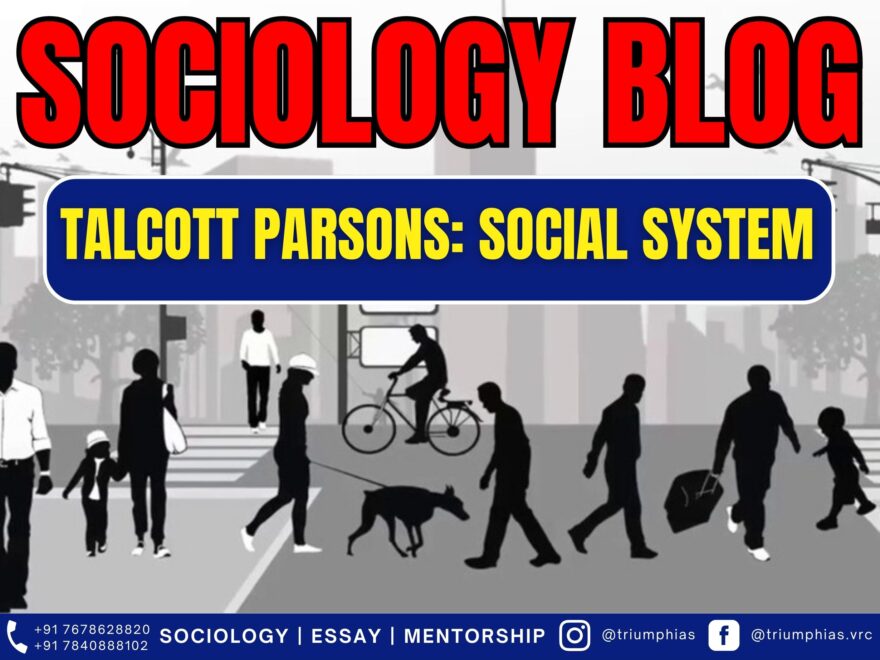



297 comments